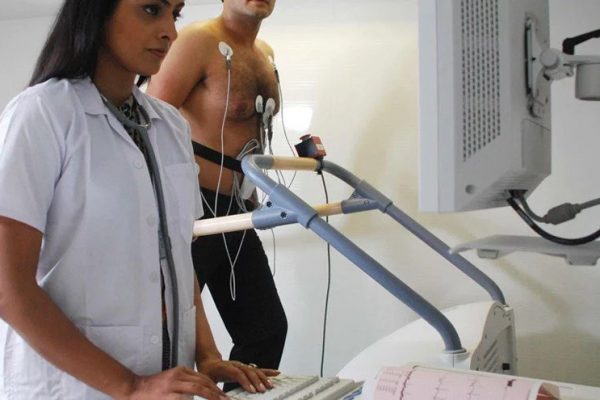
Stress testing shows how your heart works during physical stress (exercise) and how healthy your heart is. A standard exercise stress test uses an EKG (electrocardiogram) to monitor changes in your heart’s electrical activity. Imaging stress tests take pictures of blood flow throughout your heart.
A stress test, also known as an exercise test or treadmill test, is used by doctors to find out how well a patient’s heart works during physical activity. It can determine up to which level, an exercise can be safe for you. In this test, you will be told to walk on a treadmill and the performance of your heart is monitored as well as how much can your heart make up before having arrhythmia or any abnormality in blood supply. The stress test cost varies from lab to lab and the stress test cost also depends on your location. The average cost of a stress test ranges between INR 1800 and INR 2500.
As you start walking on the treadmill, the speed and incline of the treadmill will be increased, so as to push your heart to perform more under a stressful condition. Your ECG, Blood Pressure & heart rate will be monitored throughout the procedure.
Before a stress test
- Do not eat or drink anything except water at least 2 hours before the test.
- Do not consume caffeine for at least 12 hours before the test.
- If you use the inhaler for breathing, get it along with you for the test.
- This test will take about an hour.
Procedure
As you arrive for the test, you will be given a gown to wear which has a front opening. A technician will take your ECG, blood pressure and heart rate before the test. Then at ten different points on your chest, alcohol will be applied and electrodes will be put on. You will be told to walk on a treadmill and as time passes, the speed and inclination will increase. Your ECG, Blood Pressure & heart rate will be monitored as you are undergoing this test.
These three factors will again be examined after the test is completed. The results before, during and after the test will be piled up and given to your doctor for examining them.
While you exercise, if you experience any kind of discomfort or breathe shortness, dizziness or fainting, you will be told to stop the test immediately.
After Stress Test
Your doctor will examine the results and see if you have any underlying heart defects or malfunctions in your heart. You will be called and be given an idea of what should be the next step and the next line of treatment.

